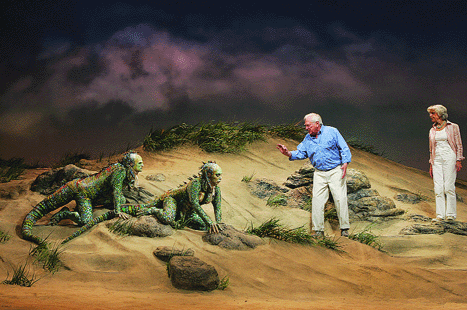An uncanny case for evolution, and God has nothing to do with it
Couples have been bickering ever since the first sea creatures slithered out of the primordial ooze onto dry land. And if that sounds farfetched, check out the delightful revival of Edward Albee’s 1975 Pulitzer Prize winning play, “Seascape,” courtesy of Lincoln Center Theatre. You’ll start believing in absurdities you never thought possible.
Only Albee, the celebrated 77-year-old playwright, can craft a scenario where two giant English-speaking sea lizards, along with a retired human couple, contemplate the nature of love, commitment, evolution, and other very deep issues—and have the audience riveted, tittering, and nodding in recognition. And when I say lizards I do mean lizards.
The play is deceptively simple, taking place on a secluded swath of sand dune over the course of a late afternoon. There’s Nancy, painting a watercolor seascape, trying to cajole her incorrigible husband, Charlie, to embark on a wondrous tour of the world’s beaches. He is content to stay put and enjoy a well-earned rest, scribbling in crossword puzzles. Annoyed, Nancy asks with sharp sarcasm, “Why don’t we settle in to waiting… give in to the palsy?”
The conversation shuttles from the fond, like when Charlie recalls extended underwater dives among the fish as a boy, to the frustrating, like when Nancy confesses a period in their marriage when she nearly left him. She fails to convince her taciturn husband to take a plunge into the ocean just beyond the ridge, to relive boyhood joys. “I’d rather remember,” grouses Charlie.
When the cold-blooded intruders arrive, it’s hard to say which couple is more apprehensive. The green, scaly two-some is much younger and regards the humans as, well, as if they were the monsters. The sweet Sarah and her excitable male partner, Leslie, act a lot like any young couple, save for the jerky movements and 6-foot tails.
Apparently, it’s their first foray on terra firma—birds fascinate them and airplanes scare them silly. The menacing jets, which boom overhead now and again, signify manmade technology and progress. They are intruders of another kind.
“They’ll crash into the dunes one day. I don’t know what good they do,” says Charlie nearly each time one roars by.
For the balance of the play, the older and presumably wiser couple teaches the visitors about the ways of the evolved world, such as childrearing, tools, mortality, and emotion. In one hilarious exchange, Nancy, a grandmother, even flashes her “mammaries” to Sarah, who, being an amphibian that has laid over 7,000 eggs, has none of her own.
In Albee’s satirically witty, existentialist style, the crash course raises some mind-twisting questions. What is progress? Is being an illusion? Who is better off? And, more urgently, will these newcomers stick around?
Despite the sheer brilliance of the premise and dialogue, the production could never fly without top-notch performances, and, boy, does “Seascape” have them. Frances Sternhagen is flawless as Nancy. Nostril’s flaring and arms flailing, she skillfully commands our attention, and our sympathy, even when sharing the spotlight with the awesome aliens.
The gifted George Grizzard, who shifts from pleasant to petulant and back again with the alacrity of a young child, was born for Albee. In 1996, Grizzard won the Tony Award for the revival of “A Delicate Balance,” and, in an odd echo of the play’s evolution theme, he originated the role of Nick in “Who’s Afraid of Virginia Woolf,” on Broadway more than 40 years ago. This perennial Albee masterwork, you may recall, enjoyed an acclaimed restaging on Broadway last year.
And you have to hand it to Elizabeth Marvel (“The Seagull”) and Frederick Weller (“Glengarry Glen Ross”), who are thoroughly convincing, and endearing, as the inquisitive lizards. How they scramble across those rocky dunes, in what must be punishingly hot and cumbersome lizard suits, is astonishing. The magnificent, glistening costumes, by Catherine Zuber, lend the creatures a dignified beauty. Kudos must also be paid to “movement coordinator” Rick Sordelet, who learned a thing or two about animal choreography with “The Lion King.”
Considering the lack of set changes, flashbacks, or theatrical pyrotechnics, the nearly two-hour production moves along at a surprising clip, and we have Mark Lamos—who also directed Albee’s “Tiny Alice”—to thank for that.
The vast azure sky features ingeniously projected clouds that shift even more gradually than real clouds do. Michael Yeargan, fresh off his Tony Award win for “Light in the Piazza,” designed the set.
Considered the greatest living American playwright—sadly, Arthur Miller and August Wilson, other contenders for that honor, passed away this year—Albee received a special 2005 Tony Award for Lifetime Achievement. Just last month, SAGE, the senior LGBT group, honored the playwright, who claims to have been openly gay since he was 12, with a similar award. He also received the Pulitzer Prize for “A Delicate Balance” in 1966 and for “Three Tall Women” in 1991, plus a slew of other honors.
Although authored over three decades ago, “Seascape,” in its utter belief in the inexorable march of evolution, for better or worse, resonates afresh today. In light of the current brouhaha over the religious right marrying the Bible to Darwin, proclaiming it “Intelligent Design” and foisting it on our schoolchildren, it’s a relief there are no picket lines at the theater.
Albee once described the aim of his work as a “condemnation of complacency,” and surely he had “Seascape” in mind. In a world of accelerating flux, Charlie’s Darwin-esque warning to “mutate or perish” has never rung truer.
After a lifetime of accomplishment, Albee could easily have opted to be like Charlie, and rest on his considerable laurels. Lucky for us, with two new plays in the works, he’s just a big Nancy, embracing life to the hilt.
gaycitynews.com



































